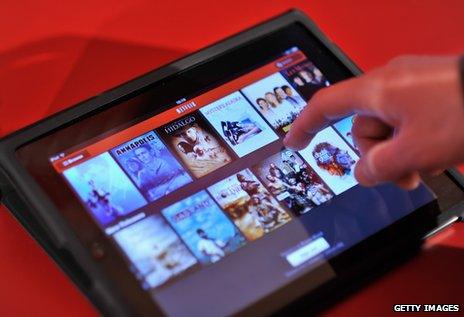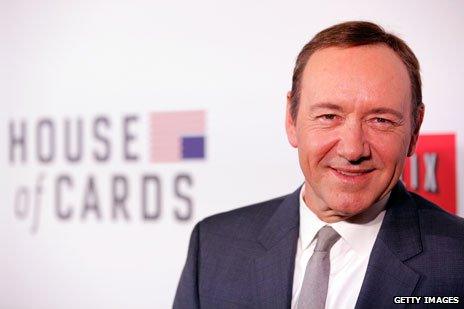Music, TV and digital disruption
- Published
- comments

Music and television, two creative industries which, in the fashionable jargon, are being "disrupted" by the internet. But there is evidence this week that music is at last getting to grips with that disruption, while the TV industry - where change has come more slowly - is suddenly getting nervy about a scrappy outsider.
The BPI's annual Digital Music Report, external has been charting the changes in its industry for a while - but the latest edition seems to show that 2012 was the year when the digital revolution finally began to start paying and stop hurting.
More than a quarter of all adults are now purchasing downloads or using legal streaming services, and in the third quarter of 2012, 51% of UK record label revenue came from digital sales.
Bad news of course for the High Street (no wonder HMV has struggled) but evidence that British consumers have finally got the legal digital habit.
Is pirated music going out of fashion? No, the survey shows that 345 million tracks were downloaded using BitTorrent in six months, and that's just one source.
But in the same period, 239 million tracks were legally downloaded and, given that the industry used to reckon the ratio of illegal to legal downloads was 10:1, that looks like progress.
There is certainly a new mood of optimism amongst the record labels and the report looks to an even brighter future where we all keep our legally obtained music in the cloud and stream it to our cars, our phones or our TVs, wherever we go. "We're actually looking to a future where revenues could grow!" an insider told me with some excitement.
After years in which the industry has been slow to see the way through the digital jungle, it's at last got to grips with the idea that content plus convenience is the answer.
Sure, consumers like the something for nothing that illegal file-sharing offers - but if you make it simple and attractive to get good music legally, they are increasingly happy to pay for it.
Television has had a rather different experience with digital disruption. Fifteen years ago we assumed that the internet was about to cause major upheaval in the industry, with the channel, the schedule and live broadcasting all doomed to extinction as savvy consumers compiled their own menu of on-demand viewing.
But in the UK that hasn't happened anything like as rapidly as predicted. The vast majority of TV viewing still involves turning on the main set, sitting back and watching what's on the main channels.
In this industry, content and convenience have worked so far in the favour of the incumbents who can offer viewers plenty of compelling programmes and a simpler way of getting them than fiddling about on the internet. So television executives have become a little more relaxed about the threat to the status quo.
This week, though, I think I saw a threat to that complacency.

Kevin Spacey is the star of Netflix's House of Cards
Sitting in bed, I started watching on a tablet computer the excellent Kevin Spacey in the American remake of that great 1990s political thriller, House of Cards. The series has been made not by a major broadcast network but by Netflix, the movie- and TV-streaming business which arrived in the UK from the US a couple of years ago.
So far, it has made little impact here, struggling to match BskyB when it comes to hot new movies. In fact, I'd been about to end my subscription when I saw the publicity around the House of Cards launch.
It looks as though Netflix has also learned that "content plus convenience" lesson. You can have the smartest technology platform around, but nobody will be that interested if you haven't got something to watch which can't be found elsewhere.
And if the big content providers won't give you want you want, then make your own compelling programmes. It has cost Netflix a tidy sum - $100m apparently - to make House of Cards, but if that helps to build a global customer base it could be worth it.
So, for a modest monthly fee you can now watch a whole top notch drama series without waiting a week for the next episode, and without having to turn on the TV or remembering to record it.
If that catches on and is imitated by other new suppliers of video content, then maybe those predictions of the death of traditional telly won't look so far-fetched.